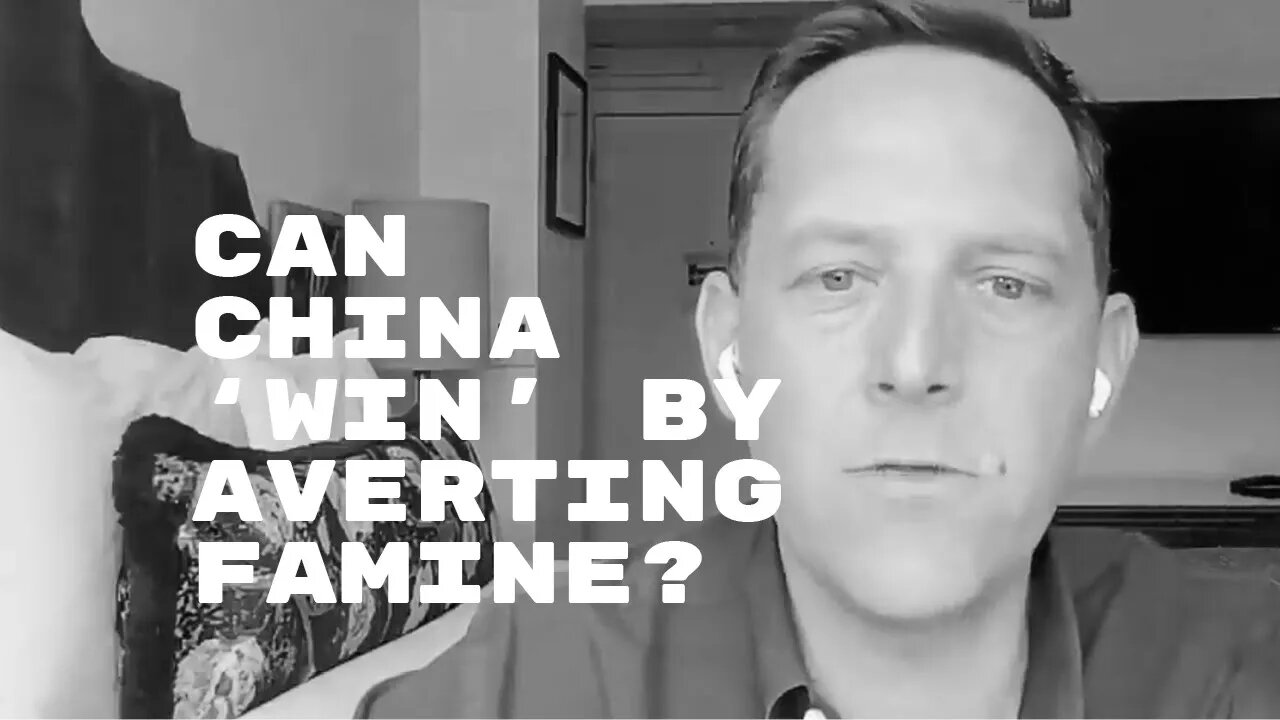Premium Only Content

Friedberg: China to gain leverage by closing the world's "calorie gap"
Billionaire investor David Friedberg predicts that China will use their huge food surplus to bridge the calorie gap, avert famine and gain power across the Middle East and Africa.
"One of the questions that people are now asking, which I said would become a really critical next step in this crisis, is "how are we going to bridge the gap in calories? Where's the food going to come from? And how are we going to feed nations that are almost entirely dependent on imports that are running out of food, or are out of food?"
I've mentioned in the past that the whole world runs on a 90 day food supply, which means roughly 25% of the world's calories are in storage right now. But that's not the case uniformly. So some countries like Tunisia and Somalia, Ethiopia, have close to zero calories in storage. Some countries, like the United States are roughly 30–40% of our annual consumed calories are sitting in storage.
China, is a complete outlier. For years, China has been stockpiling food. And at this point, China has 150% of their annual consumption of food in storage. So they have supplies, that if all food production and imports stopped in China, they would be able to feed their population for one and a half years. That's an incredible supply of food. So if you look around the world, to places like Sri Lanka, and Somalia that are struggling to figure out how to bridge this gap on calories that's about to hit us. Egypt's about four months of food, by the way, and Egypt is dwindling, they cannot get the food out of the Black Sea. So China is going to be one of the very few potential solutions for bridging the calorie gap over the next year. And I have a strong prediction and a strong belief that because of that, China will use it to maximum leverage. And we will see over the next year, an incredible amount of leverage and power being accumulated by China, because of transactions that they're going to start to enter into, to bridge the calorie gap around the world. So in the Horn of Africa, for example, there has been this continuous presence of China, trying to give themselves a military base trying to take some influence over local media. And there has been this kind of push and pull with the, you know, certain populations around whether or not we should kind of embrace China locally. And I think that, for example, the the food crisis that we're seeing emerge in Ethiopia, Somalia, Eritrea, Djibouti, is going to be resolved by China. And China's going to end up gaining influence gaining military presence, and establishing a more permanent foothold in the Horn of Africa, because of the position that they're in of strength. With all these calories, and the and the need in these regions. That's not just their Sri Lanka, other parts of Southeast Asia, even Western Africa, Northern Africa, China is going to show up. And they're the only country that can show up the UN the World Food Program, they're going to do everything they can to shuffle calories around, change food supplies. But I do think that one of the things that everyone's going to be watching and it's a slow roll, this isn't going to be some one big deal. And everyone wakes up over the next year, while the US is, you know, trying to do everything we can to maximally impose sanctions on Russia, China is slowly turning the crank around the world, on the influence that they are going to gain because of this food crisis. And the absolute, you know, surplus that they have locally, and the ability to export that surplus to support needs around the world, and it's not going to be free, it's not going to be cheap." –David Friedberg
Orig source:
All In podcast with Chamath Palihapitiya, Jason Calacanis, David Sacks & David Friedberg
https://www.youtube.com/watch?v=AEvMI6R6Er0
-
 2:55:53
2:55:53
Laura Loomer
7 hours agoEP138: Media Goes Crazy Over Loomer Loyalty Tip Line
46.2K16 -
 8:35
8:35
MattMorseTV
12 hours ago $0.44 earned1.7 million ILLEGAL ALIENS just DISAPPEARED.
34.5K45 -
 2:28:15
2:28:15
The Quartering
6 hours agoDestroying The Paintress's Heart
43.8K1 -
 10:28:28
10:28:28
SpartakusLIVE
16 hours agoNEW Partnership w/ Anthros Chairs! || #1 Early and ALWAYS ON-TIME WZ Streamer || Duos w/ WoesGG
38.4K1 -
 1:21:58
1:21:58
Anthony Rogers
1 day agoEpisode 377 - The Missouri Criminal Justice Playbook
31.7K -
 1:30:18
1:30:18
Adam Does Movies
11 hours agoTalking Movies + Ask Me Anything - LIVE
23.9K1 -
 2:23:31
2:23:31
Joker Effect
6 hours agoJoker Mentors LiveStreamers in Chat... A Stream That Will Change Your Life
22.6K3 -
 1:43:36
1:43:36
Glenn Greenwald
9 hours agoShould Obama Admin Officials Be Prosecuted for Russiagate Lies? Major Escalations in Trump/Brazil Conflict | SYSTEM UPDATE #498
138K110 -
 1:23:46
1:23:46
RiftTV
9 hours agoBitcoin Maximalist Dr. Jack Kruse EXPOSES Trump Admin: El Salvador Our LAST HOPE?! | Rift TV
43K12 -
 1:03:42
1:03:42
Sarah Westall
11 hours agoTHE BIG FAT RED LINE: Removing Free Will by Eliminating Options & Knowledge w/ Glenn & Eric Meder
44.9K4